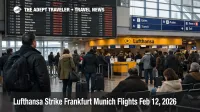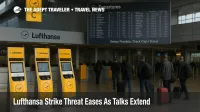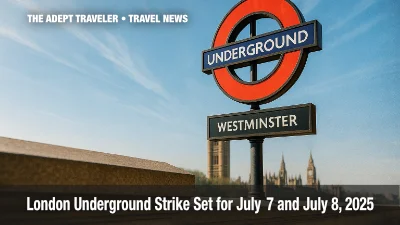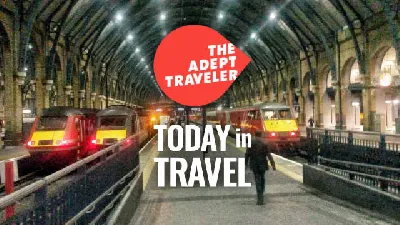Strikes in Germany
Strikes in Germany have a significant impact on both regional and international travel, causing a variety of disruptions and inconveniences for tourists and residents alike. In a country recognized for its efficiency and punctuality, labor strikes can be frustrating and unexpected for travelers. This detailed description will examine the nature of strikes in Germany, the industries most affected, and the potential impact on various aspects of travel, from transportation to accommodation and activities.
The German Economy and Worker Rights
The German economy is the largest in Europe and fourth-largest in the world, with strong industries in manufacturing and exports, most notably automobiles. Germany also boasts an extensive public transportation network, including buses, trams, subways, regional trains, and high-speed rail connections. These well-developed industries and services contribute to the overall efficiency of the German economy, yet they are not immune to labor strikes.
In Germany, as in most democratic countries, workers have the right to organize and negotiate for better wages and working conditions. Trade unions play an essential role in organizing worker strikes, which can last anywhere from a few hours to several weeks. While strikes are typically peaceful and legal, they can disrupt essential services and have wide-reaching effects on travelers.
Industries Most Affected By Strikes
Transportation is the industry most commonly affected by strikes in Germany, with air traffic controllers, airport ground staff, pilots, train operators, and public transportation workers all participating in strikes in recent years. The two major German airlines, Lufthansa and Eurowings, have been hit by several strikes, causing flight cancellations and delays. Similarly, the rail transportation provider Deutsche Bahn has had its fair share of employees walkouts, significantly disrupting train services across the country.
Other sectors, including hotels, public administration, telecommunications, and manufacturing, have also experienced work stoppages due to labor disputes, although with less frequency and, as a result, less impact on travel. For example, while a hotel strike may inconvenience guests with limited services or alternative accommodations, a transportation strike could potentially strand thousands of passengers.
Impact on Transportation
Strike-related disruptions in transportation can range from mild inconveniences to severe complications, especially for those with tight schedules or pre-booked accommodations and activities. When a strike impacts long-distance trains or airlines, travel between cities may require rescheduling or finding alternative modes of transport, potentially costing both time and money.
During a public transportation strike, tourists exploring major cities might need to rely on taxis, rental cars, or bicycles, which can be both more expensive and less efficient than public transport. It is essential for travelers to stay informed of potential strikes in advance and have backup transportation options available.
When a strike does occur, numerous knock-on effects are felt throughout the transportation network. For example, in the event of a rail strike, the remaining trains may operate on a reduced schedule, often resulting in overcrowded trains or lengthy delays.
Impact on Accommodations
Apart from causing inconveniences at hotels directly affected by strikes, disruption to transportation services can result in travelers being unable to reach their pre-booked accommodation, often leaving them to find last-minute alternatives. Hotels near transportation hubs may experience an influx in demand from stranded passengers, leading to limited vacancies and increased prices for last-minute bookings.
When a hotel itself is affected by a strike, it may continue operating with limited staff, which can result in limited services and longer than usual check-in times. In extreme cases, hotel management may relocate guests to other establishments, causing inconvenience and uncertainty for the affected travelers.
Impact on Activities and Attractions
Strikes in Germany can also impact popular tourist activities and attractions. For example, public museums or landmarks may be closed or operate at reduced hours due to strikes by public-sector employees. Before embarking on a visit to a particular site, it is important for travelers to check the latest information on closures or disturbances.
Similarly, guided tours or special events may also be affected by strikes. In cases where a tour operator or event staff participate in a strike, the event may be canceled altogether, or the itinerary may be altered to accommodate the disrupted services. Once again, tourists would need to monitor the latest updates on labor disputes and adjust their schedules accordingly.
Mitigating the Impact of Strikes
While Germany is known for its efficient transportation and services, labor strikes remain an inevitable aspect of modern society. Consequently, understanding the potential impact of strikes on travel, staying informed about possible disruptions, and planning contingences, is vital for travelers seeking to minimize their inconveniences.
Travel insurance can be a valuable safety net in case of unexpected disruptions, such as strikes. Many policies can reimburse additional travel costs or accommodation expenses incurred due to cancellations or delays caused by strikes. It is crucial, however, to review the terms and conditions of the specific policy and understand what is covered and what is excluded.
In conclusion, strikes in Germany can have wide-ranging effects on travel, from transportation disruptions, complications with accommodations, and impacts on popular activities and attractions. While preempting and avoiding all disruptions may not always be possible, staying well-informed and developing backup plans can help mitigate their effects and ensure a smoother travel experience.
Lufthansa Strike Germany Rebooking and Refund Rules

Lufthansa Strike Recovery Flights Germany Feb 13

Lufthansa Strike Frankfurt Munich Flights Feb 12, 2026

Lufthansa Germany Flight Strike Disrupts Feb 12, 2026

Germany Strikes Hit Local Transport Feb 10 11

Germany Transit Strike Risk for City Travel Feb 9

Germany Transit Strike Risk For Cities Ahead Of Feb 9

Western Europe Strike Spillover Risk For Airport Transfers

Germany Transit Strike Disrupts Berlin Transfers, NE Rail

Lufthansa Strike Threat Eases As Talks Extend

Lufthansa pilot strike ballot runs through September 30

London Underground Strike Set for July 8-9: What Tube Riders Need to Know

Navigate Spring 2024 Europe Strikes: Travel Advisory

April's Europe Strikes: Impact on Travel Explained

Strike Impact: Navigating Europe's Travel Disruptions

Travel Trends 2023: Navigating Strikes, Cruise Line Policies on Cannabis, & Transatlantic Air Travel Boom

Massive Strikes in Germany: Transportation Gridlock Amid Unions' Wage Demands

